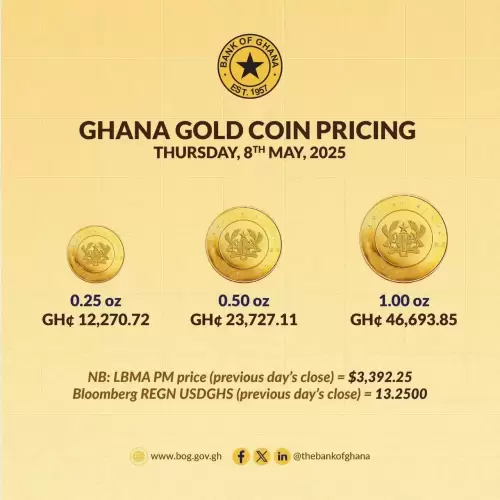 |
|
 |
|
 |
|
 |
|
 |
|
 |
|
 |
|
 |
|
 |
|
 |
|
 |
|
 |
|
 |
|
 |
|
 |
|
Cryptocurrency News Articles
From New Hampshire to Taiwan: Same Currency, Different Stakes
May 11, 2025 at 08:05 pm
New Hampshire, a pioneer in the United States, was the first to test bitcoin as a reserve asset. For this federated state, the goal was to explore monetary sovereignty on a local scale.

The initiative of New Hampshire to integrate bitcoin into its reserves has barely interested the Web massively. But today, the echo is becoming global with Taiwan also examining the same strategy, considering allocating 2.5 billion dollars to BTC. A strong signal of a possible global monetary shift.
A federated state in the United States, New Hampshire was a pioneer in testing bitcoin as a reserve asset. For this state, the goal was to explore monetary sovereignty on a local scale. Taiwan, on the other hand, operates in a much more complex environment. Between pressure from China and dependence on the dollar, its proposal to integrate 5% BTC into its reserves, out of a total of 50 billion dollars, is surprising.
This initiative is part of a redefinition of the role of national currencies, with clear geopolitical motivations. The integration of this digital asset could symbolize a strategic will for emancipation from dominant powers.
Deputy Ko JU-CHUN explained that bitcoin offers coverage against financial and monetary uncertainties. With its technical features - limited supply, decentralization, portability - it could complement a portfolio of assets composed of 577 billion dollars in currencies and 423 tonnes of gold. Taiwan thus seeks to protect itself from a possible financial war, anticipating sanctions or asset freezes. According to Ko, BTC could offer:
Finally, on a political level, this choice could spark tensions with Western allies, especially the United States, which is very watchful regarding the strategic use of crypto-assets. This transition therefore requires alignment between the technical, legal, and political spheres to be successful.
On the technical level, Deputy Ko met with Samson Mow, CEO of Jan3, to discuss the optimal methods for securing and managing bitcoin in large quantities. This meeting aimed to identify the technological solutions necessary for managing such a large sum in a secure manner.
On the legal level, bitcoin is still classified as a speculative asset, not as legal tender. This legal status could pose problems for integrating it into a framework of national reserves. A redefinition of bitcoin's legal nature might be necessary to legitimize this initiative.
Integrating bitcoin into a national reserve policy presents structural challenges that go beyond the technical and legal domains. It also implicates a broader political and economic calculus.
This move by Taiwan to diversify its reserves with bitcoin could have significant implications for the global financial landscape. It highlights a broader trend among nations to seek alternatives to the U.S. dollar and explore new avenues for economic sovereignty in an increasingly interconnected world.
If Taiwan, a technologically advanced economy, does decide to allocate a portion of its reserves to bitcoin, it will join a small club of jurisdictions that are experimenting with models for investing in cryptocurrencies.
Earlier this year, El Salvador, which made bitcoin legal tender in 2021, announced plans to invest a portion of the country's reserves in bitcoin. The government said it would use the country's bitcoin earnings from tourism to diversify its investment portfolio.
Moreover, nations that are subject to U.S. sanctions, such as Russia, Iran, and the Central African Republic, have also shown interest in bitcoin as a means of circumventing the financial system and maintaining economic stability.
This move by Taiwan could also be seen as a response to the increasing threat of China, which claims sovereignty over Taiwan. By diversifying its reserves and seeking new avenues for economic cooperation, Taiwan is attempting to reduce its dependence on both China and the United States.
As the world continues to navigate the complexities of the global financial system, the role of cryptocurrencies, particularly bitcoin, is likely to come into sharper focus. Nations are actively seeking optimal models for investing in these assets and navigating the legal and political landscape to realize the full potential of digital currencies in managing their national finances and asserting economic sovereignty.
Disclaimer:info@kdj.com
The information provided is not trading advice. kdj.com does not assume any responsibility for any investments made based on the information provided in this article. Cryptocurrencies are highly volatile and it is highly recommended that you invest with caution after thorough research!
If you believe that the content used on this website infringes your copyright, please contact us immediately (info@kdj.com) and we will delete it promptly.
-

-

-

-

-

-

-

- Renowned NBA Player Scottie Pippen Declares That the Highly Anticipated Altcoin Season Has Commenced While Expressing His Interest in Shiba Inu (SHIB)
- May 12, 2025 at 06:05 pm
- Renowned NBA player Scottie Pippen declares that the highly anticipated altcoin season has commenced while expressing his interest in Shiba Inu (SHIB).
-

-


























































